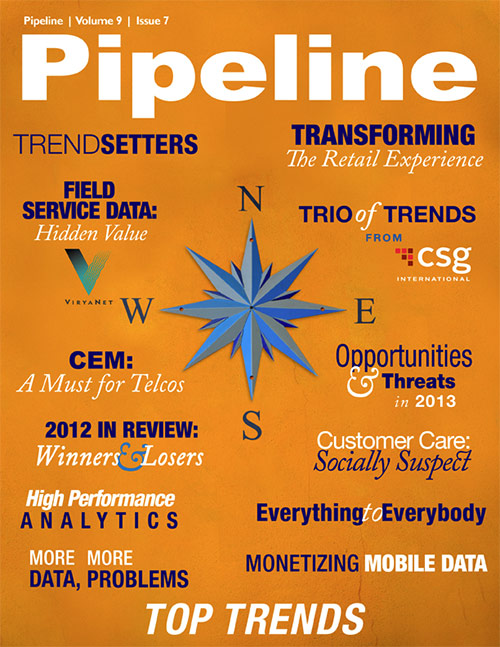The Top Trendsetters of 2012
BROADBAND EXPANSION

Daniel McCarthy
President and COO
Frontier Communications
Frontier Communications has been able to do what Verizon either couldn’t or wouldn’t do, expanding broadband access to unserved and underserved markets in rural America, thereby creating
long-term, positive economic and social impacts for people in those markets.
Daniel McCarthy, who was promoted to president in April, oversees the broad effort to follow through on commitments Frontier made in May 2009 when it acquired 4.8 million lines, mostly rural, from Verizon Communications for $8.6 billion. One such commitment was to increase the number of newly acquired customers with broadband access from 65 to 85 percent by the end of 2013. After its latest $77 million investment in Oregon and Washington, which the company revealed in October, and the doubling of broadband rates for 28 communities in Appalachian Ohio, announced in September, Frontier is well on its way to meeting that commitment.
Maggie Wilderotter, the company’s CEO, said McCarthy helped her reorganize the company’s people and processes in the field after it tripled in size 28 months ago: “I am extremely confident in Dan’s abilities, track record and wealth of field experience. He will drive continued success at Frontier.”
During the company’s earnings call in July, McCarthy said that Frontier expects its 20Mb service to move from 28 percent of current residential households to 42 percent by year’s end and 52 percent by the end of 2013. More importantly, broadband availability improved to 85 percent on its three main commitments to the FCC; Frontier is at 79 percent overall now and needs to be at 80 percent by the end of this year. “That is a level we expect to exceed,” McCarthy said. “Network design and engineering, field operations and marketing are working together towards this goal.”
M2M COMMUNICATIONS

Jahangir Mohammed
Chief executive officer
Jasper Wireless
Few emerging technologies have been as simultaneously bolstered and burdened by the high expectations laid upon them as M2M communications. The projections for the number of devices that will
need to be supported in very short order are staggering. We’ve all heard them: Harbor Research projects 250 million mobile devices by 2014 (Berg Insight reported there were already 108 million as
of last year), and 5 billion more static ones. ABI Research says that by 2016 the market will be worth $35 billion. There is a wide range of projections, but they are all good.
The strongest impediments to reaching them are a lack of standards and appreciation for the level of collaboration that will be required. Jahangir Mohammed understands this: he founded Jasper Wireless in 2004 and is an AT&T Bell Laboratories and Lucent alum as well as the founder of Kineto Wireless, which developed a GSM standard for Wi-Fi-cellular convergence.
For the last five years Mohammed has led the effort to form the global partnerships necessary to advance M2M and help it realize its potential. Current Analysis said recently that the M2M ecosystem announced some unusual partnerships that nonetheless “may solve a set of problems which have thwarted the widespread growth of global M2M deals.”
The analyst firm said the Jasper Wireless service delivery platform, which is used by all the players in a recent alliance announcement, including KPN, NTT DoCoMo, Rogers Communications, SingTel, Telefónica, Telstra, and VimpelCom, provides a uniform portal for service activation, SIM management, troubleshooting, and subscription management. Other Jasper users not in the alliance include América Móvil, AT&T and Etisalat. This alliance exists alongside, and perhaps in competition with, other standards body-related alliances. Kitty Weldon, principal analyst for enterprise mobility at Current Analysis, said, “Without these partnerships, significant revenues for the operators, device manufacturers, platform developers, and application providers that make up the ecosystem may never be realized.”


















